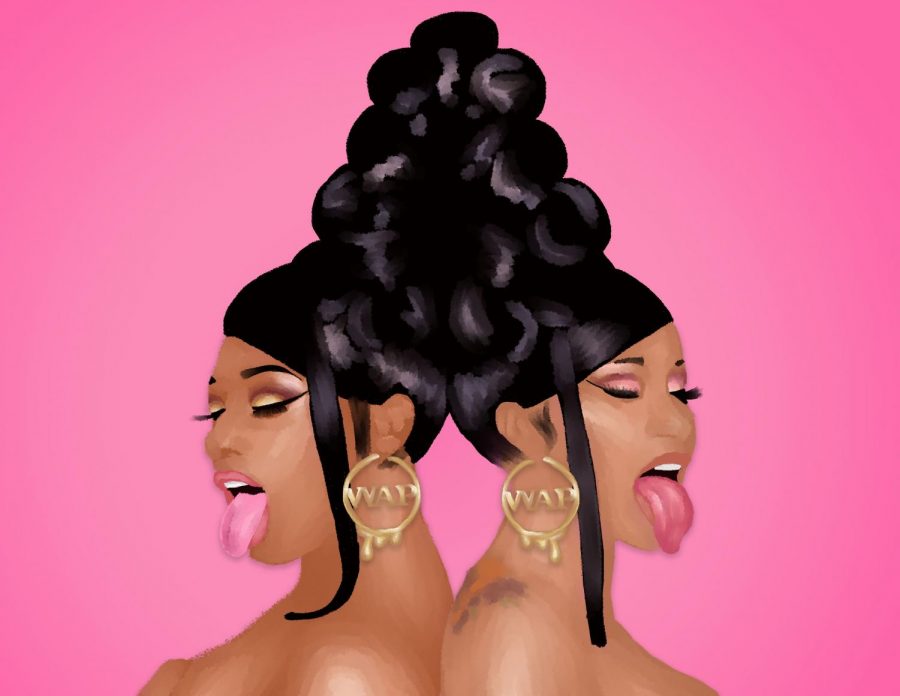Criticism of ‘WAP’ song is rooted in misogyny and sexism
Recent release “WAP” by Cardi B and Megan Thee Stallion created a stir because of the suggestive lyrics.
September 14, 2020
Rap superstar Cardi B broke the internet last month when she released her single “WAP” with fellow rapper Megan Thee Stallion.
The song debuted at the top of the Billboard Hot 100 chart. It broke numerous streaming records and spawned a viral TikTok dance challenge.
The track’s suggestive lyrics have been the subject of controversy. Those criticizing the song’s content are using outdated and predictable assertions to criticize and shame the artists.
Several right-wing commentators offered opinions about the song. Fox News contributor Tucker Carlson criticized the song during a recent rant on his show. “It’s aimed at young American girls — maybe your girls, your granddaughters — and what is it doing to them?” he said.
His message implies the song was specifically marketed to young girls, when the song’s obvious audience is adults. If a child had access to the song or video, that is ultimately on the child’s guardian, not the artists. Expecting all artists to be role models to children is unrealistic, especially when they make content specifically marketed to adults.
Carlson said: “We’re not being prudish here. This is not James Brown being sexually suggestive on stage.”
It is very telling that Carlson used James Brown, a man, as an example of the “acceptable” way of being sexually suggestive. It is misogynistic and suggests women are not allowed to display their sexually suggestive side. If Carlson is going to stand by his criticism of “suggestive” material, he should hold male artists to the same standard.
Carlson also slammed Joe Biden for agreeing to interview Cardi B. “Go online right now and look up the lyrics to this song,” Carlson said. “And then ask yourself, if you were Joe Biden, would you suck up to the person who sang it and ask yourself above all, and ask it more than once, what is this doing to our kids?”
His criticism of Biden’s interest in interviewing Cardi implies she is not worthy or intelligent enough to be interviewed because of the sexual nature of her song.
Former Republican congressional candidate DeAnna Lorraine wrote in a tweet that the song was “vile” and the rappers are “completely wrong” if they think the song does “anything to empower women.”
I wouldn’t expect Lorraine to know much about empowering women, as she vigorously defends and supports President Donald Trump, who openly said he would “grab [women] by the [expletive deleted].”
It is interesting that she so vocally supports a man who has embraced the sexual assault of women but takes issues with women owning their sexual agency.
I completely disagree with her opinion that the song does nothing to empower women. If anything, the song’s subject matter empowers women to not feel ashamed and to own their sexuality.
Cardi B said she found the criticism amusing, taking to Twitter to respond to an article listing Republicans boycotting the song. “This is kinda iconic and I’m living for it,” she tweeted in all capital letters.
It’s no surprise she is unbothered by the backlash. The boldness of “WAP” was what made it so successful. Its immediate success and the countless memes the song has inspired shows society is becoming more receptive to women owning their sensuality in their art. The culture of shaming women for being vocal about their sexuality is being chipped away, making it harder to push legislation geared toward stifling and attacking women’s rights.
Misogyny in Rap Culture
Male hip-hop artists have received significantly less backlash for expressing their sexual prowess compared to their female counterparts. When female rap artists do so, it’s considered raunchy, unladylike, or, as singer CeeLo Green said according to Far Out Magazine, “salacious gesturing” aimed at getting ahead in the rap industry.
Green’s comments are an example of how rap culture shames women within the genre. Where is the criticism for the way women are used and disrespected by male rappers? Where is the outrage over the overtly sexual lyrics male rappers have used for decades? Rap culture tends to expect so much out of women rappers, but rarely holds their male counterparts to the same standards. This is extremely sexist.
Megan Thee Stallion also took to Twitter again to respond to the complaints about the song, writing: “Lol dudes will scream ‘slob on my knob’ word for word and crying abt WAP 😂 bye lil boy.” She is correct. For decades, male rappers have used women’s bodies to push their art. Songs like “Baby Got Back” by Sir Mix-a-Lot and the more recent “Dance (A$$)” by Big Sean are examples.
Some people expect women to be asexeual beings, or at least to keep their sexual desires to themselves. Those are ridiculous and unfair standards. Sexuality is a natural part of life.
So while they can be controversial, songs like “WAP” are important. They force us to look at and challenge the double standards women face.


